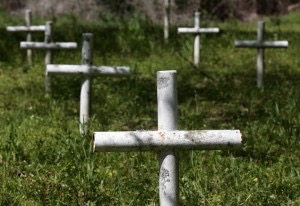
DNA testing identifies another body at infamous Florida School for Boys
By Ben Montgomery, Times Staff Writer Tuesday, August 4, 2015 2:20pm
TAMPA — Robert Stephens was murdered in 1937 and buried in an unmarked grave on the campus of Florida’s oldest state-run reform school, the Florida School for Boys, in the Panhandle town of Marianna. On Tuesday, University of South Florida researchers announced that they have identified his remains using DNA and returned them to the boy’s family.
“Sometimes persistence pays off,” said Erin Kimmerle, a forensic anthropologist at USF who is leading a project to identify the human remains excavated from the brutal reformatory campus. Stephens is the sixth boy to be identified. The state believed the cemetery contained 31 burials until USF researchers found 51, most of them buried in the woods surrounding a marked burial ground.
Stephens was buried supine, his arms folded across his abdomen. His remains were too deteriorated to determine cause of death, Kimmerle said, but records from the school and the Jackson County clerk’s office say he was stabbed to death by another inmate, Leroy Taylor, on July 15, 1937, just after his 15th birthday and after 10 months of confinement for breaking and entering. His remains did reveal that he had a severe ear infection and his dental hypoplasia suggests he was diseased or malnourished, Kimmerle said.
(click here to see the rest of the story from Ben Montgomery at the Tampa Bay Times)
———————————————————————————————————————
Key FL lawmaker wants a federal probe into abuse allegations at Dozier School for Boys
March 2, 2015
U.S. Sen. Bill Nelson (D-FL) is asking the U.S. Justice Department to examine new evidence about the deaths of youth at the now defunct Dozier School for Boys in Marianna, FL. In a letter dated February 24th to U.S. Attorney General Eric Holder Nelson wrote,“Given new information about wards of the shuttered reform school, and a long history of mistreatment allegations surrounding the Arthur G. Dozier School for Boys in Marianna, FL, I believe the department is uniquely positioned to provide an outside and independent review.”
Nelson said earlier in February University of South Florida researchers reported they have found the remains of 51 individuals buried on the grounds of the reform school. He says this contrasts with a 2009 investigation by the Florida Department of Law Enforcement which concluded 31 individuals were buried on the school grounds.
“I remain troubled that university researchers have uncovered information not contained in the state’s 2009 report,” said Nelson.
The USF team conducting the excavations received a grant to do their forensic research in 2013 from the National Institute of Justice. The team used a variety of technology, including ground penetrating radar, to find the grave shafts of at least 50 unmarked burial sites.
Senator Nelson told Attorney General Holder the USF research indicates children at Dozier suffered from nutritional deficiencies, lack of dental care, and underdevelopment. In one grave, officials discovered what they think may be a buckshot.
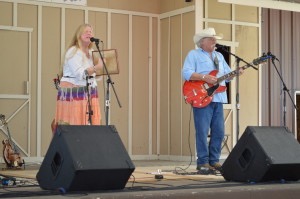
Singer Songwriter Maggie McKinney from Econfina Creek, FL, just north of Panama City says she had several friends who were sent there as teenagers.
McKinney’s song about the unmarked graves at the Dozier School for Boys is called, “Lost Boys of Dozier.” The song is included in a video she and her husband Michael McKinney (Lucky Mud) produced featuring pictures from the now closed reform school.
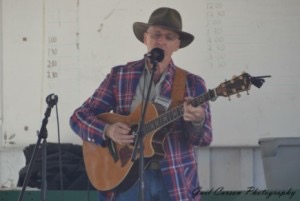
Singer Songwriter Al Scortino from Sebastian, FL was also inspired to write a song about the unmarked graves of the boys who died at the Dozier School for Boys called, “Marianna.”
The work continues to identify the remains and how they died through scientific techniques including DNA matching. According to a press statement, researchers uncovered bones, teeth, and numerous artifacts in all of the burials. The research team is expected to develop a “summary report” for each body, including findings from not only the skeletal and dental remains, but uncovered artifacts, and burial context.
The team is continuing its efforts to find surviving families of former Dozier students to collect DNA. The research team has released a list of those families online. Anyone with information on the families should call Hillsborough County Sheriff’s Master Detective Greg Thomas at (813) 247-8678.
There is also a website dedicated to finding answers for family members.
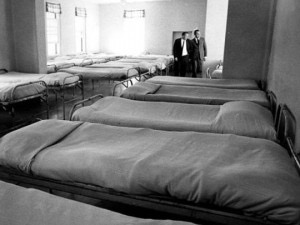
The Dozier School for Boys opened at the turn of the twentieth century in Marianna, west of Tallahassee. State records indicate 96 boys died while housed there. The juvenile reform school has been the subject of repeated state and federal investigations.
According to a statement from the research team, the search for unmarked burials is set to resume at the shuttered school in the coming months using specially-trained K-9 teams and ground penetrating radar.
Earlier Posts
September 3, 2013
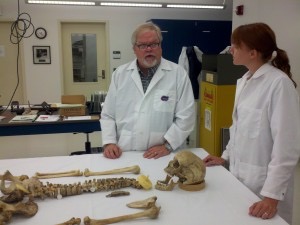
The first round of excavations ended on Tuesday at the now closed Dozier School for Boys in the Marianna community in Florida’s Panhandle with the discovery of the skeletal remains of two bodies. University of South Florida Anthropologist Erin Kimmerle and a team of archaeologists are working to exhume, identify and examine bodies from unmarked graves at the school’s cemetery from the time period of 1914 to 1952. It’s the kind of work that University of Florida forensic specialists know very well. Program Director for the C.A. Pound Human Identification Lab at the University of Florida’s Anthropology Department, Michael Warren has worked a wide variety of high profile cases through the years, including the Caylee Anthony murder case and the recent murder of Seath Jackson in Summerfield. In the latter case Warren was asked to testify during the trial four times. Prosecutors say Jackson was shot, dismembered and burned before being dumped into an area water body. A jury found Michael Bargo guilty of first degree murder in that case. Four others in the case have been convicted.
Michael Warren talked with WUFT’s Amanda Jackson and Donna Green-Townsend about what the process will be like for the USF team doing the excavation of the unaccounted for bodies at the now closed Dozier School for Boys in Jackson County. Warren says he’s confident about the work USF Anthropologist Erin Kimmerle and her team will be doing over the next few months. The excavation of bodies from the Dozier School for Boys began on Saturday, August 31st, 2013. The unmarked graves received national attention after a group of former students, under the name, “The White House Boys Survivors Organization,” made allegations of abuse while residing at the school. Researchers believe there are at least 31 unmarked graves from between 1914 to 1952. USF received $190,000 from the state legislature and nearly $424,000 from the U.S. Department of Justice for the work. He described the process the USF team will be going through:
Published on Sep 2, 2013
USF anthropology professor Erin Kimmerle talked to reporters as exhumations begin at the Boot Hill cemetery at the Dozier School for Boys in Marianna, FL on Saturday. USF researchers are exhuming dozens of graves at the former Panhandle reform school in hopes of identifying the boys buried there and learning how they died.
(video courtesy CNN, edited by Mark Schreiner)
USF Anthropologist Erin Kimmerle speaks at Dozier